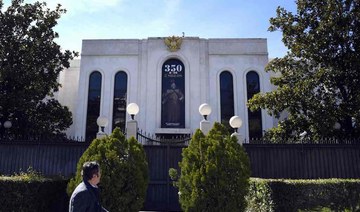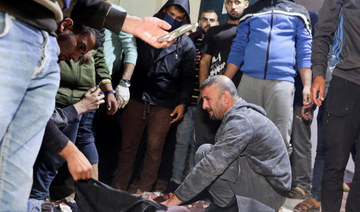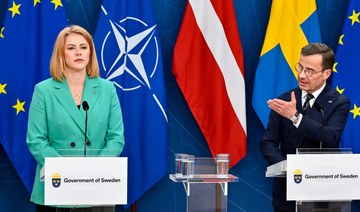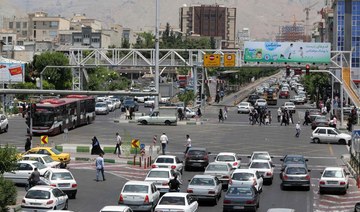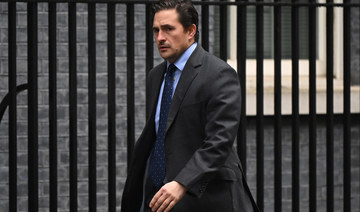BRUSSELS: French Finance Minister Bruno Le Maire said Tuesday that there is a “total determination” from all 27 European Union countries for sanctions against Russia that could target oil and coal over evidence its troops deliberately killed Ukrainian civilians.
Europe’s dependence on Russian oil, gas and coal means finding unanimity on energy measures is a tall order, but the reports of the killings outside Kyiv have increased pressure for tougher EU sanctions.
So far, Europe has not been willing to target Russian energy over fears that it would plunge the European economy into recession. In some ways, it would be easier for Europe to go without Russian oil than gas because most supplies come by tanker and could be purchased from other suppliers. But talk of a possible boycott of Russian oil has helped push up global oil prices this week.
Asked whether there was a political willingness to impose sanctions on Russian oil and coal — a move suggested this week by French President Emmanuel Macron — Le Maire said: “We will see what the position of the other member states will be, but I think there is a possibility to have unity on the 27 member states on these new sanctions.”
He did not mention natural gas, and a consensus on targeting the fuel that is used to generate electricity and heat homes would be even more difficult to secure. The EU gets about 40 percent of its natural gas from Russia and many EU countries, including Germany — the bloc’s largest economy — are opposed to cutting off gas imports.
France holds the presidency of the EU Council, and Le Maire spoke ahead of a meeting of EU finance ministers in Luxembourg, where they will discuss possible new measures to punish the Kremlin.
While the EU has stayed away from sanctioning Russian energy so far, individual countries have announced efforts to draw down their reliance: Poland said it plans to block imports of coal and oil from Russia, while Lithuania said it’s no longer using Russian natural gas.
The European Union gets about 25 percent of its oil from Russia, while the EU imported 53 percent of hard coal from the country in 2020, which accounted for 30 percent of the EU’s hard coal consumption.
While coal and oil may be up for discussion, Teresa Ribera, Spain’s Minister for Ecological Transition, said Tuesday that it is “very hard” for the EU to sanction Russian natural gas because some of the bloc’s countries are dependent on it for their energy supply and that the EU’s strength lies in its unity.
“It is very difficult to explain to European public opinion and Ukrainian society that we are still importing Russian energy that finances this war,” she said, adding that energy imports create “obvious moral tension.”
European importers pay about $850 million per day for Russian oil and natural gas.
Russian natural gas mostly comes by fixed pipeline and would be harder to replace suddenly with shipments of expensive and scarce liquefied natural gas. While oil might be easier to cut off than gas, ditching it would not be without consequences.
For one, the resulting price increases for other oil could increase the incentive for India and China, who aren’t taking part in Western sanctions, to buy cheaper Russian crude. Russia is also a major supplier of diesel fuel; if that supply were lost, operating diesel-powered trucks and farm equipment could quickly become more expensive, fueling already high inflation in Europe.
Oil prices rose as buyers seeking to avoid Russian oil bid for limited supply from other producers like Saudi Arabia, commodities analysts at German bank Commerzbank said.
International benchmark Brent rose 3 percent on Monday and traded Tuesday above $108 per barrel, up another 1 percent. US crude rose 1.1 percent to $104.37 on Tuesday. Crude prices had fallen after US President Joe Biden last week announced the release of 180 million barrels of oil over six months from strategic reserves. Higher oil prices mean more expensive gasoline for US drivers.
The next package of EU sanctions will be prepared by the EU’s executive arm, the European Commission, which will then present it to EU countries for approval.
France pushing for energy sanctions against Russia
https://arab.news/29mny
France pushing for energy sanctions against Russia
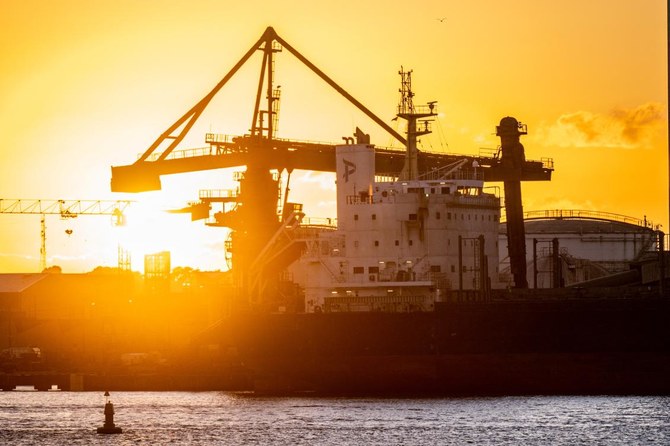
- Poland said it plans to block imports of coal and oil from Russia
- Meanwhile, Lithuania said it’s no longer using Russian natural gas
UK’s foreign secretary supported arms sales to Israel days after British aid workers killed in Israeli strike
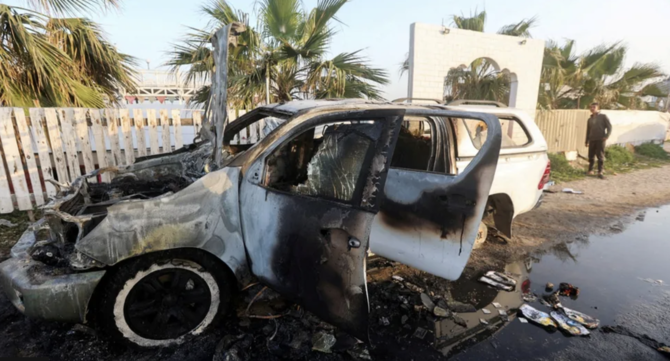
- Attack on World Central Kitchen convoy killed 7 people in total
LONDON: Britain’s foreign secretary recommended that the UK continue selling arms to Israel just days after an Israeli strike on a World Central Kitchen convoy killed three British aid workers.
David Cameron supported the continuation of arms sales two days after the strike on April 1, and the Secretary of State for Business and Trade Kemi Badenoch approved the decision on April 8, The Guardian reported on Thursday.
Cameron said earlier this week that the strike that killed the Britons, in addition to four aid workers of other nationalities, revealed systemic and personal failures by members of the Israel Defense Forces.
Cameron’s decision seems to have been based on an assessment of Israeli compliance with humanitarian law that did not cover the deaths of the aid workers due to a time lag in the government’s process for deciding if British arms exports were at risk of being used to commit war crimes.
There was a possibility that the business department’s assessment did not cover any incidents after Jan. 28.
An update on the handling of arms export licenses that took into consideration events up until the end of February was prepared, but the British Foreign Office has declined to say if that was included in the advice given to ministers.
Opposition Labour MPs claim the time delay means there is a possibility that no comprehensive ministerial-level assessment of Israel’s conduct of the war in Gaza has been made in the last three months.
Lawyers and campaigners who have examined the evidence provided by the Foreign Office have come to the same conclusion.
World Central Kitchen said on Monday it would resume operations in the Gaza Strip, a month after the Israeli airstrike.
Prior to halting operations, WCK had distributed more than 43 million meals in Gaza since October, representing by its own accounts 62 percent of all international nongovernmental aid.
NATO condemns Russian ‘malign activities’ on its territory

- The incidents “are part of an intensifying campaign of activities” Russia is carrying out across the Euro-Atlantic area
- NATO allies “express their deep concern over Russia’s hybrid actions, which constitute a threat to allied security“
BRUSSELS: NATO on Thursday condemned Russian “malign activities” on its territory, saying actions like disinformation, sabotage, violence and cyber interference threatened the alliance’s security.
The incidents “are part of an intensifying campaign of activities” Russia is carrying out across the Euro-Atlantic area and NATO allies “express their deep concern over Russia’s hybrid actions, which constitute a threat to allied security,” NATO said in a statement.
Authorities in the Czech Republic, Estonia, Germany, Latvia, Lithuania, Poland and Britain have recently investigated and charged people in connection with “hostile state activity.”
NATO said allies would work together to deter and defend against the hybrid actions and that they would remain steadfast in supporting Ukraine as it struggles to fend off Russia’s invasion, now in its third year.
Last month, a 20-year-old British man was charged with masterminding an arson plot against a Ukrainian-linked target in London. Moscow’s ambassador Andrey Kelin dismissed claims of links to Russia as “absurd” and “unfounded.”
In late March, Czech authorities said they had busted a Moscow-financed network that spread Russian propaganda and wielded influence across Europe, including in the European Parliament.
Israeli private eye arrested in UK over alleged hacking for US PR firm

- An initial attempt to extradite Amit Forlit to the United Sates was thrown out by a judge at Westminster Magistrates’ Court on Thursday
- Forlit was arrested under an Interpol red notice at London’s Heathrow Airport
LONDON: An Israeli private investigator wanted by the United States was arrested in London over allegations that he carried out a cyberespionage campaign on behalf of an unidentified American PR firm, a London court heard on Thursday.
An initial attempt to extradite Amit Forlit to the United Sates was thrown out by a judge at Westminster Magistrates’ Court on Thursday on a legal technicality.
Amy Labram, a lawyer representing the United States, had told the court that Forlit “is accused of engaging in a hack for hire scheme.”
Labram said that the US allegations include that an unnamed Washington-based PR and lobbying firm paid one of Forlit’s companies 16 million pounds ($20 million) “to gather intelligence relating to the Argentinian debt crisis.”
Forlit was arrested under an Interpol red notice at London’s Heathrow Airport as he was trying to board a flight to Israel, according to the USauthorities.
Forlit is wanted in the US on three charges: one count of conspiracy to commit computer hacking, one count of conspiracy to commit wire fraud and one count of wire fraud.
A judge ruled that the attempt to extradite Forlit by the United States could not continue as he was not produced at court within the timeframe required under British extradition law.
“He was not produced at court as soon as practicable and the consequences of that ... he must – I have no discretion – he must be discharged,” Judge Michael Snow ruled.
Forlit and his lawyer did not immediately return messages seeking comment. The Federal Bureau of Investigation did not immediately return a message.
Forlit has separately been accused of computer hacking in New York by aviation executive Farhad Azima. Azima, whose emails were stolen and used against him in a 2020 trial in London, is suing Forlit and others in federal court in Manhattan.
Forlit has previously acknowledged retrieving Azima’s emails but has denied hacking, telling Reuters he innocently stumbled across the messages “on the web.”
Death toll jumps to at least 48 as a search continues in southern China highway collapse
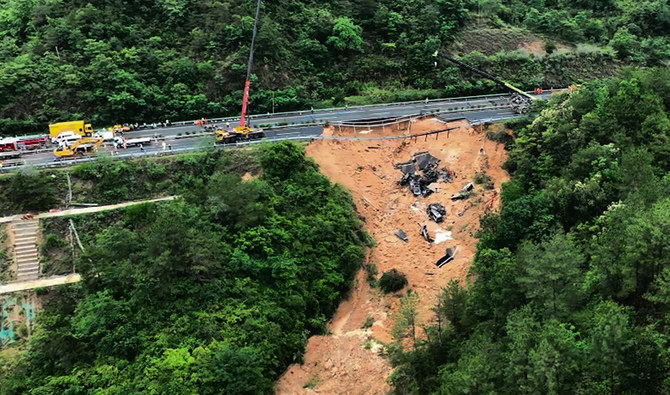
- One side of four-lane highway in Meizhou city gave way after a month of heavy rains
- Twenty-three vehicles fell down a steep slope, some sending up flames as they caught fire
BEIJING: The death toll from a collapsed highway in southeastern China climbed to 48 on Thursday as searchers dug for a second day through a treacherous and mountainous area.
One side of the four-lane highway in the city of Meizhou gave way about 2 a.m. on Wednesday after a month of heavy rains in Guangdong province. Twenty-three vehicles fell down a steep slope, some sending up flames as they caught fire. Construction cranes were used to lift out the burnt-out and mutilated vehicles.
Officials in Meizhou said three other people were unidentified, pending DNA testing. It wasn’t immediately clear if they had died, which would bring the death toll to 51. Another 30 people had non-life-threatening injuries.
The search was still ongoing, Meizhou city Mayor Wang Hui said at a late-afternoon news conference. No foreigners have been found among the victims, he said.
Search work has been hampered by rain and land and gravel sliding down the slope. The disaster left a curving earth-colored gash in the otherwise verdant forest landscape. Excavators dug out a wider area on the slope.
“Because some of the vehicles involved caught fire, the difficulty of the rescue operation has increased,” said Wen Yongdeng, the Communist Party secretary for the Meizhou emergency management bureau.
“Most of the vehicles were buried in soil during the collapse, with a large volume of soil covering them,” he said.
He added that the prolonged heavy rainfall has saturated soil in the area, “making it prone to secondary disasters during the rescue process.”
Over 56 centimeters (22 inches) of rain has fallen in the past four weeks in the county where the roadway collapsed, more than four times as much as last year. Some villages in Meizhou flooded in early April, and the city has seen more rain in recent days.
Parts of Guangdong province have seen record rains and flooding in the past two weeks, as well as hail. A tornado killed five people in Guangzhou, the provincial capital, during rain and hail storms last weekend.
The highway section collapsed on the first day of a five-day May Day holiday, when many Chinese are traveling at home and abroad.
Chinese leader Xi Jinping said that all of China’s regions should improve their monitoring and early warning measures and investigate any risks to ensure the safety of the public and social stability, state broadcaster CCTV said.
UK Veteran’s Minister Mercer to risk jail over Afghanistan inquiry
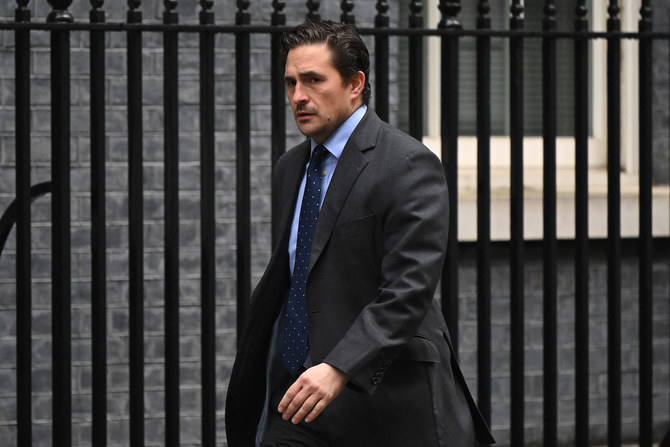
- Friends suggest minister will refuse to hand over identities of whistleblowers over fears for their well-being
- Mercer faces potential 52-week jail term, which would cost him his role as a minister and MP
LONDON: UK Veteran’s Minister Johnny Mercer will risk prison by not revealing the identities of whistleblowers to an inquiry investigating the killings of innocent people in Afghanistan.
The Times reported that friends of the MP had suggested he would rather be a “man of integrity” over the matter ahead of a deadline to hand the names to the inquiry, chaired by Lord Justice Haddon-Cave, next week.
Mercer has already given evidence to the inquiry, which is investigating allegations of extrajudicial killings and cover-ups by UK Special Forces between 2010 and 2013.
Appearing in February, he said a Special Forces soldier told him that in 2017 he was asked to carry a weapon to plant on an unarmed civilian to make them seem like an enemy combatant. He refused to reveal the source and others out of fear for their safety, with suggestions that some may be suffering from post-traumatic stress disorder and could be mentally vulnerable.
Haddon-Cave gave Mercer until April 5 to reveal the names, which was later extended. Failure to comply, he was warned, could result in a year-long prison term, which would cost him his job as a minister and his position as an MP. He could also face a fine.
One friend of the MP told The Times: “The inquiry doesn’t seem to realise that nothing will destroy their authority more than putting the veterans’ minister in the dock — the one man the military community trusts.
“If they do this, no one from the military community will want to co-operate with the inquiry. They seem to think Mercer will fold under the pressure and they will get their way. But he won’t. He will go down as a man of integrity and the inquiry will lose all support.”
Former Armed Forces Minister James Heappey said Mercer should reveal the identities of his sources.
“I admire Johnny enormously for the way that he has done politics under his own rules with an incredible sense of mission … He is a remarkable man but on this particular point I think for him, for his family and actually for the credibility of the inquiry I think he does need to disclose these names,” Heappey said.
On Friday, the inquiry will examine the Ministry of Defence’s failure to provide evidence to it on time. It is still waiting to hear from senior officials, including former Defence Secretary Ben Wallace.
It has also heard allegations that Gen. Gwen Jenkins, future national security advisor and former Special Boat Service head, locked away a report into claims of extrajudicial killings instead of passing it to military police.
Mercer also suggested during the inquiry, which began in December 2022, that the next head of the UK Army Lt. Gen. Sir Roly Walker had given “unbelievable” testimony over claims that Special Air Service personnel had killed unarmed Afghans.
An investigation by The Times, meanwhile, has suggested that former members of specialist Afghan Army units CF 333 and ATF 444 could provide crucial witness testimony to the inquiry but that their subsequent relocation from Afghanistan was overseen by MoD officials in a potential conflict of interest.
Many had their asylum claims to come to the UK rejected, a decision now under review.



